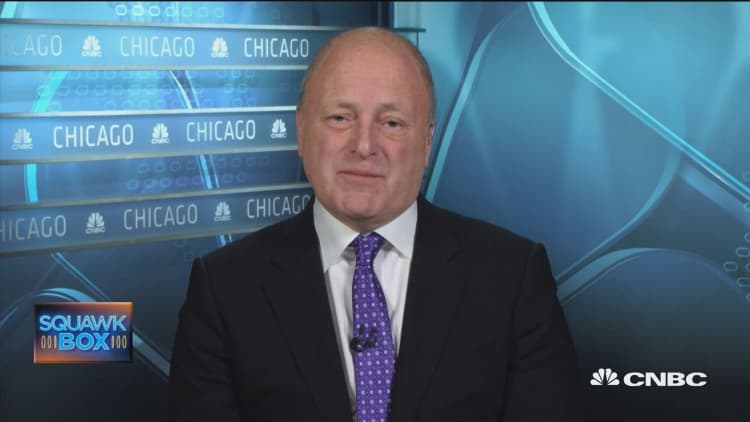President Donald Trump once assured enthusiastic crowds that Mexico would pay for his proposed border wall — even outlining a "one-time payment" proposal as a candidate. Now he says the wall would be funded "indirectly" through new revenue streams or savings created by a renegotiated trade deal.
But despite his new promise, it's far from clear how the U.S.-Mexico-Canada Agreement, or USMCA, would pay for a barrier along America's nearly 2,000-mile-long southern border.
Big political obstacles and economic uncertainties stand in the way of the outcome Trump is predicting. The USMCA's fate is uncertain in Congress, and there are economic unknowns about how possible revenue streams indirectly created by the deal would be siphoned toward the wall.

Meanwhile, a large part of the federal government remains closed after three weeks as Trump continues to insist that Congress approve funding for the wall, while Democrats refuse to budge in their opposition to the barrier.
As a presidential candidate, Trump's insistence that Mexico would pay for a concrete wall along the border was a central feature of his rallies. But Mexican leaders have said from the start of Trump's presidency that they would not subsidize the multibillion-dollar infrastructure project, which would take several years to complete and would probably face numerous legal challenges. Trump has argued that the wall is necessary because he claims there is a "crisis" and an "invasion" occurring at the border.
In December, Trump tweeted that Mexico would be "paying (indirectly) for the Wall through the new USMCA." He also claimed that it would bring "far more money" to the U.S. than the existing deal, the North American Free Trade Agreement.
On Thursday, Trump again tied the wall to the trade deal. "During the campaign, I said Mexico would pay for it," Trump told reporters. "They are paying for it with the incredible deal we made, the USMCA."
"Obviously I never meant Mexico would write a check," Trump said.
Trade deal still not approved
But even if Trump successfully negotiated billions in funding for his wall today, the USMCA wouldn't start paying for it — because it hasn't been passed yet.
While Trump signed the deal in November, it has to be approved by both chambers of Congress before it can go into effect. House Speaker Nancy Pelosi, the leader of the new Democratic majority in Congress, recently called the deal "a work in progress."
The Washington Post reported in October that the USMCA is expected to go into effect in 2020. The deal reportedly leaves intact much of NAFTA, a trilateral agreement that Trump has long excoriated as among the worst ever made. Some of the biggest changes affect U.S.-Canada trade in the auto and dairy industries.
New revenue uncertain
If the NAFTA update is passed and subsequently ratified by all three countries involved, experts aren't sure how any additional revenue or savings will be used to pay for a wall.
"I expect essentially zero change in revenue collected from tariffs arising through the USMCA," Chad Bown, senior fellow at the Peterson Institute for International Economics, told CNBC in December. "Under both the existing NAFTA and President Trump's proposed new deal, the United States charges zero tariffs on trade with Canada and Mexico."
Mexico's former chief NAFTA negotiator, Kenneth Smith Ramos, said that nothing in the USMCA would redirect money toward a wall.
Lori Wallach, director of Public Citizen's Global Trade Watch, told PolitiFact: "I do not see any scenario under which the U.S. government gets more money from Mexico per se."
"Even if the U.S. tariffs had been raised, that would be paid by Mexican exporters, not the Mexican government," she added.
The White House and the office of U.S. Trade Representative Robert Lighthizer have not responded to CNBC's requests to explain how the USMCA is expected to fund the wall.
Few options as shutdown drags on
Meanwhile, Pelosi and Senate Minority Leader Chuck Schumer's negotiations with the Trump administration over a deal to fund nine federal agencies hobbled by a partial government shutdown have imploded in recent days.
Trump is demanding that any spending package to fund those agencies include more than $5 billion for a steel barrier — an amount that would cover fewer than 250 miles of the U.S.-Mexico border, according to the Office of Management and Budget. Pelosi and Schumer have said they are open to addressing border security but have refused to agree to any border wall money.
The shutdown has now stretched into its 21st day, tying it with the longest on record.
As the negotiations flame out, Trump has increasingly floated the possibility of declaring a national emergency to bypass Congress and fund the wall. The move, which he says he has the "absolute right" to do in the face of the "national security crisis," is controversial even among some of his Republican allies in Congress.
Others, however, have encouraged him to make the declaration.
Lindsey Graham TWEET Declare emergency, build the wall now.
Meanwhile, the economic cost of the shutdown could end up at $6 billion if it drags on for another two weeks, according to a research note from S&P Global Ratings — surpassing the price tag Trump has put on the wall in his negotiations with lawmakers.


